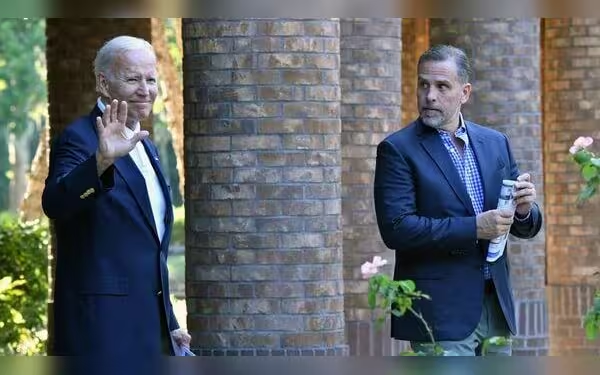Sunday, December 22, 2024 07:54 PM
Joe Biden Grants Pardon to Hunter Biden Amid Legal Controversy
- Hunter Biden receives full pardon from President Joe Biden.
- First child of a sitting president convicted in a criminal case.
- Pardon raises questions about justice and privilege.
 Image Credits: menafn
Image Credits: menafnPresident Joe Biden pardons his son Hunter, raising significant questions about justice and privilege in the legal system.
On December 1, 2023, US President Joe Biden made headlines by announcing a full and unconditional pardon for his son, Hunter Biden. This decision comes in the wake of Hunter facing sentencing for serious charges related to gun crimes and tax convictions. The pardon has sparked discussions across the nation, especially considering the President's earlier stance of not interfering with the Justice Department's proceedings against his son.
Hunter Biden, aged 54, has been under scrutiny for quite some time. In September, he pleaded guilty to nine tax offenses, which were linked to over $1.4 million in unpaid taxes. These taxes were reportedly associated with extravagant spending on items such as escorts, drugs, and luxury cars. The investigation into Hunter's financial dealings began back in 2018, making this a long-standing issue that has now culminated in a significant legal outcome.
One of the most notable aspects of this case is that Hunter Biden has become the first child of a sitting US president to be convicted in a criminal case. This fact alone adds a layer of complexity to the situation, as it raises questions about the implications of such a conviction on the Biden family's public image and the broader political landscape.
In his statement regarding the pardon, President Biden expressed that his son had been "singled out" and described the legal proceedings against him as a "miscarriage of justice." This sentiment reflects a father's protective instinct, but it also highlights the ongoing debate about fairness and accountability within the justice system.
The implications of this pardon are significant. With the presidential pardon in place, Hunter Biden will not face sentencing for his crimes, and he cannot be imprisoned for these offenses. This decision also means that the pardon cannot be rescinded by any future president, including Donald Trump, who is set to take office in January.
As the nation processes this news, it is essential to consider the broader implications of such a pardon. It raises questions about the nature of justice, privilege, and the responsibilities of those in power. While some may view this as a necessary act of compassion from a father, others may see it as an example of the unequal application of justice. Ultimately, this situation serves as a reminder of the complexities surrounding legal accountability, especially when it involves high-profile individuals.













